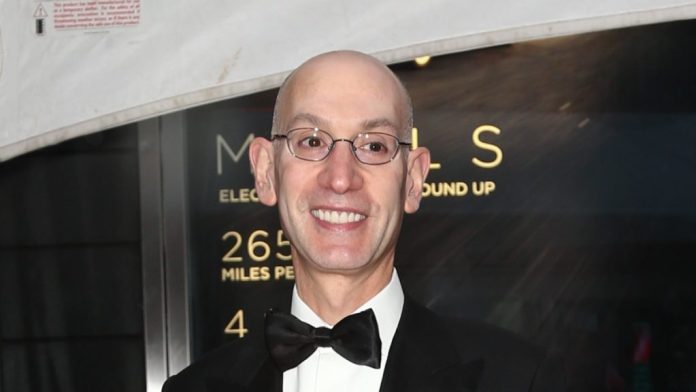When NBA Commissioner Adam Silver wrote a New York Times op-ed definitively advocating for sports betting expansion a decade ago, his words carried weight on the road to Professional and Amateur Sports Protection Act (PASPA) being repealed four years later.
Ten years on, Silver insists he doesn’t regret his public support.
In a piece entitled “Legalize and Regulate Sports Betting,” Silver drastically redirected the NBA’s previous stance on sports betting. “Betting on professional sports is currently illegal in most of the United States outside of Nevada,” he wrote at that time. “I believe we need a different approach.”
“I’d say when it comes to sports betting, I certainly don’t regret writing that op-ed piece and being in favor of legalized sports betting,” Silver told the Associated Press this week.
“I still think you can’t turn the clock back. I think, as I said at the time, with the advent of the internet, widely available sports betting online… we had to deal directly with technology and recognize that if we don’t legalize sports betting, people are going to find ways to do it illegally.”
Since Silver gave sports betting one of the biggest votes of confidence from inside the major sports world back in 2014, things haven’t so much changed as become unrecognizable.
Some 38 states plus D.C. now offer online and mobile sports betting, gamblers can bet on virtually every minute detail of an NBA game in near-real time and the NBA has a score of partnerships with gaming companies. Even Silver’s interviewer this week, the AP, has a partnership with a sportsbook, having linked up with FanDuel in 2021 for an official odds provider deal in 2021 and subsequently replaced that with an agreement with BetMGM in May.
Porter scandal casts a pall
With rapid growth comes growing pains. Silver noted that “the downsides of sports betting certainly exist,” citing incidents of underaged people betting or people gambling until they’re in over their heads.
The fact that the intersection of sports and betting can cause concerns is something the NBA has found out firsthand in painful circumstances this year.
Last spring, irregular betting activity sparked an investigation that brought to light flagrant betting violations by NBA player Jontay Porter, including the fact he had manipulated his own performances for financial gain. Silver dropped the hammer on the Toronto Raptor, banning him from the league for life, and the player later pleaded guilty to federal criminal charges.
At the time the investigation came to light, Silver said Porter had committed “a cardinal sin.”
“There is nothing more serious, I think, around this league when it comes to gambling and betting on our games and that is a direct player involvement,” he told reporters in April.
More control may be needed
In light of that scandal, Silver admitted a few weeks later that the league can only do so much to control the booming NBA sports betting market. He, like other sports administrators including NCAA President Charlie Baker, has identified player prop bets as particularly troublesome, suggesting that they “lend themselves to more shenanigans than other kinds of bets.”
Since the Porter situation, Silver has advocated for the establishment of a regulated framework, “where it’s the leagues working together with the state oversight groups and the betting companies, whether or not we have partnerships with them.” He suggested at that time that the NBA’s partnerships with leading operators DraftKings and FanDuel give the league “a lot more say” on sports betting issues.
“I was in favor of a federal framework for sports betting. I still am,” he told the AP. “I still think that the hodgepodge of state by state, it makes it more difficult for the league to administer it… We take this very seriously. As I said sort of Day 1, it’s not a huge business for us in terms of a revenue stream into the league, but it makes a big difference in engagement. It’s something that people clearly enjoy doing.
“I’d put it in the category of other things in society that I wouldn’t criminalize them, but on the other hand that you have to heavily regulate them because if there’s not guardrails, people will run afoul and create issues, problems for themselves, potentially for their families or for operations like us.”
Don’t forget to subscribe to our Telegram channel!










